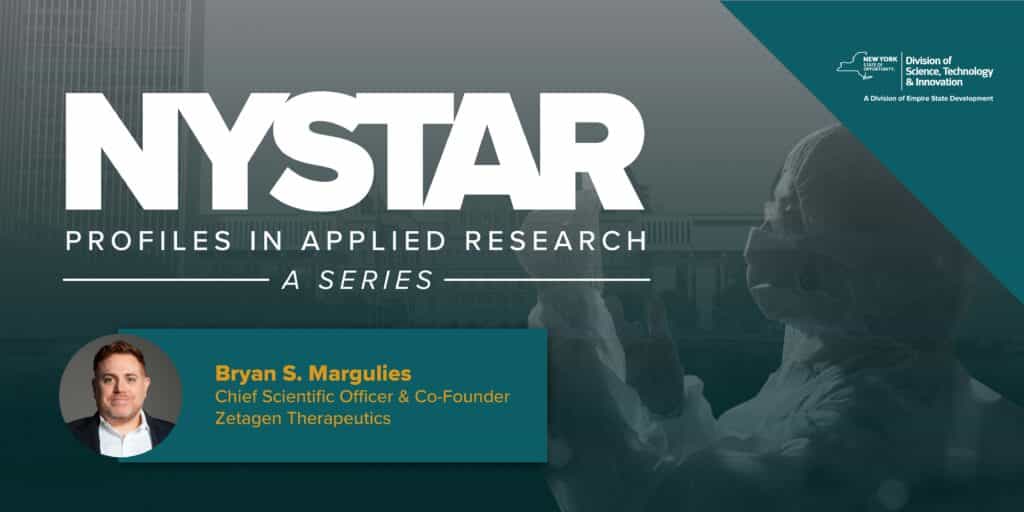Curiosity leads to breakthroughs in bone cancer treatment
It’s one of the most famous scenes from the original Star Wars trilogy. In “The Empire Strikes Back,” with the stroke of his lightsaber, Darth Vader cuts off the right hand of Luke Skywalker.
Toward the end of the movie, Skywalker is fitted with a prosthetic.
And Dr. Bryan S. Margulies was mesmerized.
“As a child, I thought that was the coolest thing and I really got into the idea of artificial tissue and limb replacement,” Margulies said.
That sense of movie magic sparked his curiosity. And when in high school he came across an article in Discover Magazine about bioengineering, he found a career path to match it.
“I didn’t know exactly what bioengineering was, but immediately I thought, ‘This is what I want to do,’” Margulies said.
By following his curiosity, Margulies discovered his academic pursuit, plunged into underexplored areas of research, and made a discovery about stimulating bone-cell growth. It culminated in 2014 when — with his colleague Dr. Nikhil Thakur, an orthopedic spine surgeon — he co-founded the company Zetagen Therapeutics, aided in large part by the Central New York Biotech Accelerator.
Their work at Zetagen focuses on treating metastatic tumors, particularly those that metastasize to the bone. Zetagen is creating products that cease the cancer and stimulate bone growth, making those with metastasized cancers more comfortable by reducing pain and potentially extending their lives.
“If we can take pain off the table, that’s big,” Margulies said. “That’s moving the needle in a significant way. But when we started, no one seemed to be working on this problem.”
Exploring under-researched cancer questions
Working on problems that aren’t getting enough attention has been part of the DNA of Margulies’ research since he first arrived at Syracuse University as an undergraduate student. While there, he worked with a series of mentors, including Dr. Tim Damron, an orthopedic oncologist who was investigating ways to administer radiation therapy to pediatric cancer patients without stunting their growth.
At that time, few people were dedicating themselves to this decades-old issue that impacted the quality of life for children.
“It was an engineering problem. It was a biology problem. And it had a clinical element to it. I was hooked,” Margulies said. “This is also where I first learned that, in medicine, we don’t really focus on children. We tend to develop things for adults and then we scale it down for kids. Treating cancer with radiation therapy was originally developed for adults in the 1940s and 1950s — not for children. Those kids have major problems that persist throughout their lives. It was this problem that had been happening for a generation or two and nobody seemed to put much effort into solving it.”
That experience became part of his motivation as he moved deeper into bone research — another area that has significant impact, particularly for cancer patients.
“Bone is this key organ system in our body that gets very little attention,” Margulies said. “The research into bone is still primitive compared to other medical fields, and it’s just because we take it for granted. But it’s really interesting tissue. It’s where all our stem cells reside and the progenitor cells for all of the blood cells. The more I learned the more I wondered, ‘Why isn’t anyone working on this?’”
Extending lives by treating bone tumors
Margulies met Thakur, his business co-founder and research partner, when they were both faculty members at SUNY Upstate Medical University. In 2012, they discovered a small molecule that causes stem cells to become bone cells — a potential game changer when it comes to treating cancer that has metastasized to the bone.
When cells from a primary cancerous tumor relocate to bone, they form small holes within the bone, weakening it and increasing the risk of fractures. The fractures are severely painful and are a major cause of death in advanced-stage cancer patients. Often, care becomes palliative and relies on heavy doses of opioids for pain management.
But the research and subsequent products created by Margulies and Thakur at Zetagen Therapeutics are designed to treat bone tumors, inhibit pain, and regenerate bone.
“We started looking at ways to make people more comfortable and maybe even extend [a person’s] life by a couple of months,” Margulies said. “When you do that, you have time to administer other therapies. Breast cancer was uniformly fatal 25 years ago and prostate cancer has largely been made curable. Those advancements came by coming up with therapies that extended life just a little bit longer — maybe three months, maybe six months. But then six months becomes a year, and the year becomes five, and then five becomes a decade. It becomes a chronic disease. And we’re really good at maintaining chronic disease.”
As Margulies and Thakur created their biotech startup, they leaned into the resources of the Central New York Biotech Accelerator — one of 20 Certified Business Incubators designated and supported by NYSTAR (Empire State Development’s Division of Science, Technology and Innovation).
That connection has been critical to research and development at Zetegen Therapeutics.
“I can’t say enough good things about the accelerator,” Margulies said. “I know other folks with biotech startups in other states, and their accelerators function as just their landlord. But here, the CNY Biotech Accelerator has been a true partner. Where we’ve had gaps in terms of facilities or resources, they’ve helped us get those resources. To have someone who understands biotech companies and is supportive of our longer incubation timeframe is just a massive, massive benefit.”
Connectivity is at the heart of the NYSTAR network, giving researchers, innovators and entrepreneurs access to resources that help advance technology, improve people’s lives, and create new jobs in New York. To find out more, visit NYSTAR online.

